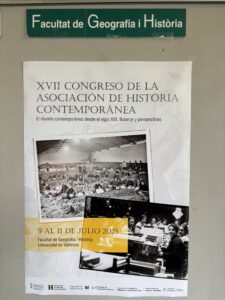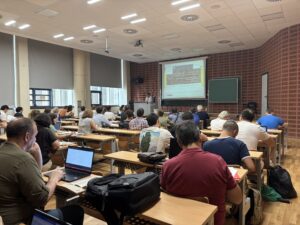 From 9 to 11 July 2025, the XVII Conference of the Spanish Contemporary History Association was held in Valencia, entitled ‘The Contemporary World from the 21st Century: Balance and Perspectives’. This is the most important conference of Spanish contemporary historians, with a wide international participation, both European and Latin American. On this occasion, more than 650 people took part in the conference and more than 500 papers were presented in 38 panels.
From 9 to 11 July 2025, the XVII Conference of the Spanish Contemporary History Association was held in Valencia, entitled ‘The Contemporary World from the 21st Century: Balance and Perspectives’. This is the most important conference of Spanish contemporary historians, with a wide international participation, both European and Latin American. On this occasion, more than 650 people took part in the conference and more than 500 papers were presented in 38 panels.
One of these panels, entitled ‘Extremist narratives in contemporary times: a look from the past to understand the present’ was coordinated by Steven Forti, lecturer at the Universitat Autònoma de Barcelona and leader of WP3 of ARENAS, and Claudia Jareño, lecturer at the Université Cergy Paris and member of WP3. Fourteen papers were accepted, seven of them from ARENAS members who presented the first results of the research carried out in WP3 focused on the historical roots of extremist narratives and their circulation in the political and media spheres in Europe between the 20th and 21st centuries.
 Sergi Soler López (Universitat Autònoma de Barcelona) presented a paper focusing on the role of the media in mainstreaming extremist narratives and historical revisionism, while Ana Yara Postigo Fuentes (Heinrich Heine Universität Düsseldorf) spoke about humour and memes as tools of historical narrative and identity configuration in the case of the extreme right in Spain. Pierre Salmon’s (École Normale Supérieure, Paris) paper focused on the French case and, more specifically, on the Spanish Civil War as a ‘lieu de mémoire’ of the extreme right in France over the last thirty years, while Nathalie Le Bouëdec (Université Bourgogne Europe) analysed the adaptation and recycling of narratives about resistance in the German extreme right. The Italian case was dealt with by Steven Forti, who analysed the use that Brothers of Italy has made in the last decade of the concept of ‘Italian pride’, which can be understood as an extremist narrative. Finally, Claudia Jareño and Gwenaëlle Bauvois (University of Helsinki) focused on the interrelation between extremist narratives and gender. Jareño delved into the femonationalist narratives of French identity feminism – linked to fear, insecurity and immigration -, while Bauvois analysed the historical roots and current challenges of the gender equality paradox in the Finnish case.
Sergi Soler López (Universitat Autònoma de Barcelona) presented a paper focusing on the role of the media in mainstreaming extremist narratives and historical revisionism, while Ana Yara Postigo Fuentes (Heinrich Heine Universität Düsseldorf) spoke about humour and memes as tools of historical narrative and identity configuration in the case of the extreme right in Spain. Pierre Salmon’s (École Normale Supérieure, Paris) paper focused on the French case and, more specifically, on the Spanish Civil War as a ‘lieu de mémoire’ of the extreme right in France over the last thirty years, while Nathalie Le Bouëdec (Université Bourgogne Europe) analysed the adaptation and recycling of narratives about resistance in the German extreme right. The Italian case was dealt with by Steven Forti, who analysed the use that Brothers of Italy has made in the last decade of the concept of ‘Italian pride’, which can be understood as an extremist narrative. Finally, Claudia Jareño and Gwenaëlle Bauvois (University of Helsinki) focused on the interrelation between extremist narratives and gender. Jareño delved into the femonationalist narratives of French identity feminism – linked to fear, insecurity and immigration -, while Bauvois analysed the historical roots and current challenges of the gender equality paradox in the Finnish case.
In the introduction to the session, held on the morning of 9 July, the two coordinators presented the ARENAS project, explaining the research in progress. The session was attended by 74 people. All the papers are available at this link.
